The AMD Ryzen 3 3300X and 3100 CPU Review: A Budget Gaming Bonanza
by Dr. Ian Cutress on May 7, 2020 9:00 AM ESTPower Consumption and Frequency Ramps
On the box, both processors are listed as having 65 W TDPs. With its Zen-based hardware, AMD has been relatively good at staying around that official on-the-box value, even during turbo. In the last generation, AMD introduced a feature called PPT, or Package Power Tracking.
- For 105 W processors, PPT is >142 W
- For 65 W processors, PPT is >88 W
- For 45 W processors, PPT is >60W
This allows the processor to raise its power limits, assuming it isn’t breaching thermal limits or current limits, and consequently raise the frequency. As a result, while we see 65 W on the box, the real world power consumption during most tasks is likely to be nearer 88 W, unless the current or thermal lines are crossed.
As a new element to our testing, we are recording power over a number of benchmarks in our suite, rather than just a simple peak power test.
AMD Ryzen 3 3300X
For the faster chip, we saw a peak power in both of our tests of around 80 W.
With yCruncher, which is somewhat of a periodic load, the power consumption dropped over time to nearer 75 W.
3DPM is more obvious with its idle steps between loads, being 10 seconds on then 10 seconds waiting. The power almost peaked at a similar amount here.
In both of these graphs, the package power when idle is around 16-17 W. I looked back through the data, and noticed that out of this power only 0.3 W was actually dedicated to cores, with the rest being towards the big IO die, the memory controllers, and the Infinity Fabric. That’s still pretty substantial for an idle load.
At low loads, the power per core was around 14 W, while at full load it was slightly less depending on the test. This is a bit away from the 20 W per core we get from the high end Zen 2 processors, but these only go to 4.3 GHz, not 4.7 GHz+. This is about in line with what we expect.
On our frequency ramp test, the Ryzen 3300X went from an idle state to peak power within 17 milliseconds, or approximately a frame at 60 Hz.
One of the new features with Ryzen 3000 is CPPC2 support, which AMD claims to reduce idle-to-turbo ramping from 30 milliseconds to 2 milliseconds. We’re seeing something in the middle of that, despite having all the updates applied. That being said, the jump up to the peak frequency (we measured 4350 MHz, +50 MHz over the turbo on the box) is effectively immediate with zero skew across a range of frequencies.
AMD Ryzen 3 3100
Given that the TDP number on the side of the box says 65 W as well, any reasonable user would assume that the power of this chip would be equal, right? Regular readers will know that this isn’t always the case.
In our yCruncher test, because the turbo frequency is lower than the 3300X, it means the voltage can be lower, and thus power is lower. Our history of testing Zen 2 has shown that these cores get very efficient at lower frequencies, to the point where our processor doesn’t even break that 65 W threshold during yCruncher.
Similarly the 3DPM peaks are also lower, barely going to 55 W during an AVX2 workload.
On the frequency ramp side, we see another instance of a 16-17 ms transition.
Summary
For the peak power out of all of our testing, we saw the Ryzen 3 3300X hit a maximum of 80 W, and the Ryzen 3 3100 go to 62 W. When we compare that to the Core i7-7700K, at 91 W TDP / 95 W peak, combined with most of the results on the next few pages, AMD by comparison is more efficient.


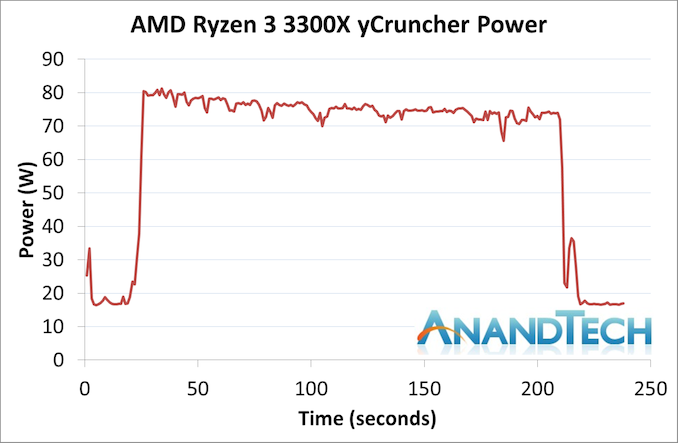
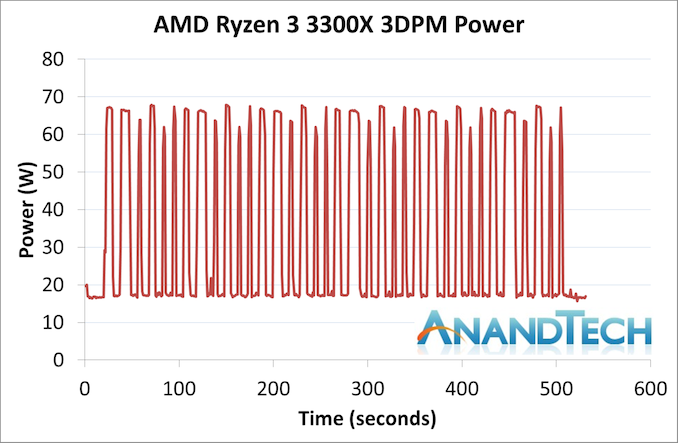
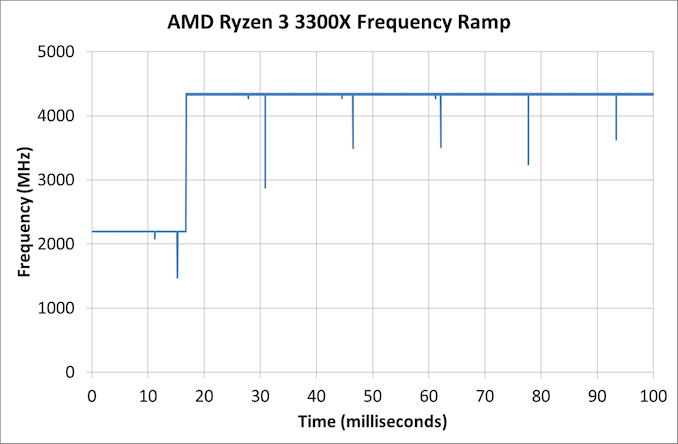
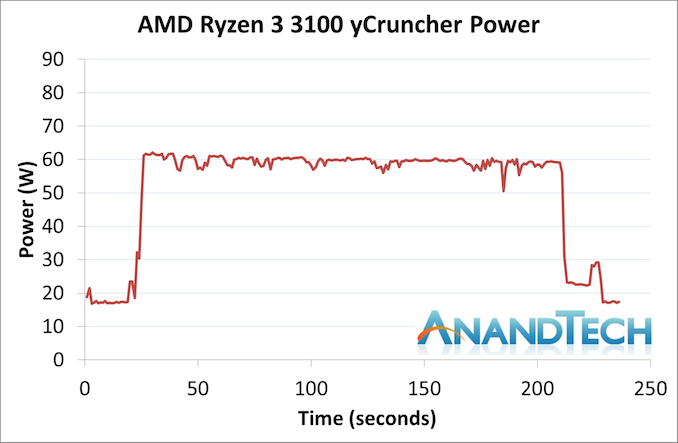
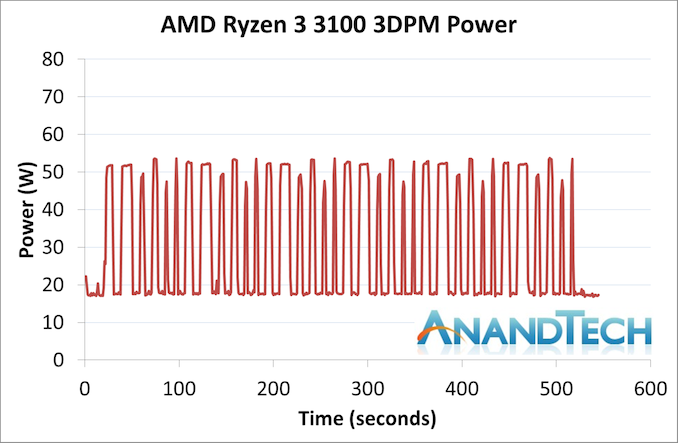
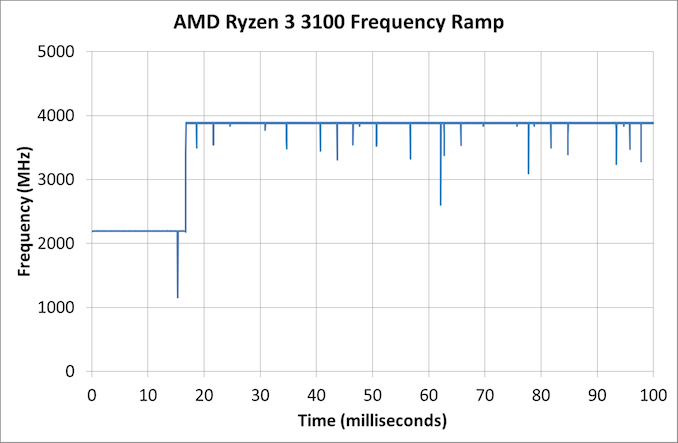








249 Comments
View All Comments
Ian Cutress - Thursday, May 7, 2020 - link
Unfortunately, we never got any of those. I'm recently stretched six ways from Sunday. Pulled an all-nighter just to even get to this point in the review process. As much as people would love me just to bench CPUs all day every day, even in lockdown I've got these CPUs, EPYC, Motherboards, Xeons, laptops to test, as well as news coverage and all the behind the scenes stuff no-one ever sees. Writing isn't a quick process, either.destorofall - Thursday, May 7, 2020 - link
Surely Ian you can just use the AI wirter now :)Lord of the Bored - Thursday, May 7, 2020 - link
The AI Writer read the comments and now just fanboy-flames.eastcoast_pete - Thursday, May 7, 2020 - link
Appreciate the reply! I think the fact that you never got those current-gen i3s and i5s is not on you, but on Intel. If they want their stuff reviewed, they know they need to send some samples. Unless, of course, they're afraid of the test results. Which they might just be.Namisecond - Thursday, May 7, 2020 - link
I just noticed in the "AMD 500 SERIES CHIPSET PROCESSOR SUPPORT" chart; 4000 series/Zen2 based desktop APUs are not represented. An oversight? or is AMD trying to say something?qwertymac93 - Thursday, May 7, 2020 - link
There's got to be something strange going on with the 7700k system. In several benchmarks the 6700k outperforms the 7700k, even though the only difference between them is the 7700k is clocked higher. Under no circumstances should the 6700k outperform the 7700k.Were the Skylake and Kaby lake systems tested with different motherboards or with different BIOS revisions? Its possible some security patch was active on one system but not on another.
EdgeOfDetroit - Thursday, May 7, 2020 - link
You should have benched it against a Xeon E-2174G. At least that's the most modern 4C8T CPU Intel sells right now. But I look forward to seeing how it does against the i3-i3-10320 to see if Intel still has the IPC-clockspeed crown or not.schujj07 - Friday, May 8, 2020 - link
The performance of the i3-10320 will be very similar to the 7700k. The i3 has clock speeds of 3.8/4.6 and the 7700k is 4.2/4.5. That means that on single threaded the 10320 will be slightly faster but in heavily threaded work loads the 7700k will probably be faster due to the higher base clock. This is know because both CPUs are on the Sky Lake architecture and will have the same IPC. Therefore we can infer what the 10320 will do based on what we see the 7700k doing in this review.Sushisamurai - Thursday, May 7, 2020 - link
I think it'd be nice to see generational to generational improvements on intel vs AMD's side of things, you guys use to do that everytime a new generation came out. It'd be nice to see how far my 4th gen Intel chip has gone vs a new gen now.Maxiking - Thursday, May 7, 2020 - link
Again your garbage reviews. Apparently all the cpus on the world are bottlenecking 1080 gtx @ 1080p except 3300x.Do you even think when checking the results. This thing happens constantly, especially when you test low end garbage amd cpus.